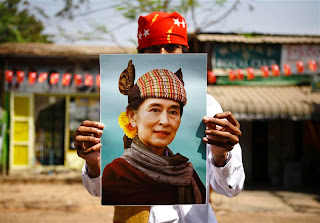 |
| Aung San Suu Kyi |
(Reuters) – Aung San Suu Kyi, the long-time standard-bearer for democracy in Myanmar, is taking a leap of faith in running for parliament on Sunday, opting to enter a political system crafted and run by the soldiers who kept her locked up for a total of 15 years.
Her party’s participation in this weekend’s by-elections marks a change of heart for the Nobel Peace Prize winner who repeatedly rebuffed the military’s attempts to bring her into a political apparatus in which it dictated the terms.
But since a general election in November 2010, followed by Suu Kyi’s release from house arrest the same month, the pace of change in the former Burma under a nominally civilian government has been staggering, enough to convince her to compromise with the apparently reform-minded ex-generals now in charge.
Some Burmese fear it is a deal with the devil that will serve mainly to endorse a military-dominated legislature.
Suu Kyi is keeping an open mind.
“Some are a little bit too optimistic about the situation. We are cautiously optimistic. We are at the beginning of a road,” the 66-year-old Suu Kyi said last month.
“Many people are beginning to say that the democratisation process here is irreversible. It’s not so.”
There is little doubt that without her National League for Democracy (NLD) party’s participation, Sunday’s by-elections for 45 seats – just 7 percent of the elected seats in a legislature dominated by the military – would have barely registered on the global news agenda.
Instead, the polls have captured the world’s imagination and, if they are deemed free and fair, could persuade the West to start to lift economic sanctions imposed under the junta.
It was the Oxford-educated Suu Kyi’s steely determination in confronting the authoritarian generals that kept her country in the spotlight during its isolation, winning the hearts of her people and giving her a crucial role in the West’s targeted policies to squeeze Myanmar’s junta.
Suu Kyi was living in Britain but returned to her family home in April 1988 to care for her ailing mother just as resentment of junta rule boiled over into nationwide protests.
As the daughter of the General Aung San, Myanmar’s assassinated independence hero, Suu Kyi was persuaded to enter politics, giving a rousing speech to hundreds of thousands of people near Yangon’s Shwedagon Pagoda that catapulted her to the forefront of the fight against dictatorship.
HERO’S DAUGHTER
“I could not, as my father’s daughter, remain indifferent to all that was going on,” Suu Kyi told the crowd in August 1988.
The military crushed the uprising the following month. Thousands were killed and imprisoned. Paying the price for her popular appeal, Suu Kyi was placed under house arrest on July 19, 1989, and remained there for six years.
Even without her, the NLD overwhelmingly won an election in 1990 for an assembly to draft a new constitution, trouncing the military’s proxy party. The junta simply refused to allow the assembly to convene.
The NLD continued to reject the military’s demand for a leading role in politics. The top generals refused to hold dialogue with Suu Kyi and questioned her patriotism by calling her by her British married name, Mrs Michael Aris.
Even in her brief periods of freedom after 1989, she never left Myanmar, afraid that the military would not let back in. For that reason she was unable to be with Aris, an Oxford academic, when he was diagnosed with prostate cancer and died in Britain in 1999.
Their love story has been played out on the big screen, with Malaysian star Michelle Yeoh playing Suu Kyi in a 2011 film “The Lady”, as she is affectionately known in Myanmar.
A final stint of house arrest – after she was found guilty of breaching an obsolete security law when an American intruder swam to her home and stayed for two nights – kept her out of the 2010 election, which the NLD boycotted and a military-backed won easily.
Insiders say the NLD was split on whether to run but Suu Kyi said she personally “would not dream” of taking part, which decided the matter.
Upon her release on November 13, 2010, thousands greeted her amid jubilation in Yangon.
The election held just six days earlier had promised little but, against all odds, the civilian administration under President Thein Sein has released more than 600 political prisoners, reached ceasefires with ethnic militias and begun to overhaul the economy.
Suu Kyi and Thein Sein, a softly spoken former junta general, have found some mutual understanding: she has called him “honest” and “sincere” and in November she accepted his appeal for the NLD to take part in the by-elections.
It will not be plain sailing.
The campaign trail has left Suu Kyi suffering from sickness and exhaustion and the NLD has alleged irregularities in the run-up to the ballot.
Suu Kyi has made no secret of the fact she wants to change a constitution that enshrines the military’s role in politics.
“There are certain laws which are obstacles to the freedom of the people,” she said during a rally. “We will strive to abolish these laws within the framework of the parliament.”
That puts her on a collision course with hardliners and an armed forces commander who just this week vowed to protect the military’s place in the corridors of power.
(Writing by Martin Petty in Bangkok; Editing by Alan Raybould and Jonathan Thatcher)
Src :
euronews 
















